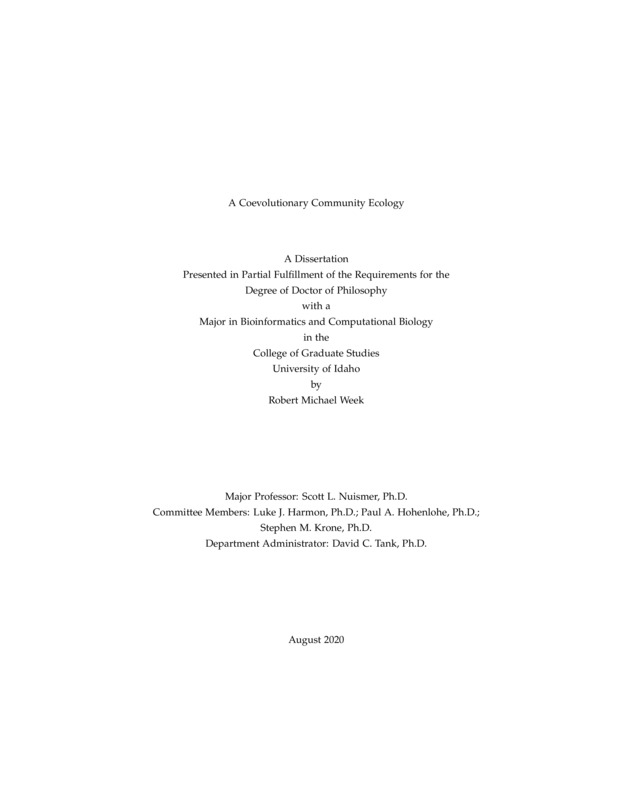A Coevolutionary Community Ecology
Week, Robert. (2020-08). A Coevolutionary Community Ecology. Theses and Dissertations Collection, University of Idaho Library Digital Collections. https://www.lib.uidaho.edu/digital/etd/items/week_idaho_0089e_11920.html
- Title:
- A Coevolutionary Community Ecology
- Author:
- Week, Robert
- ORCID:
- 0000-0001-7687-4757
- Date:
- 2020-08
- Keywords:
- coevolution community ecology diffusion limits measure-valued branching processes mutualism quantitative genetics
- Program:
- Bioinformatics & Computational Biology
- Subject Category:
- Ecology
- Abstract:
-
Species in the wild exhibit an immense diversity of forms, functions and abundances. To understand this diversity we must consider the processes that have shaped it along with the biological details these processes emerge from. For example, species are often found interacting with other species in an ecological community and these interspecific interactions can lead to a wide variety of ecological and evolutionary processes. The frequency of interspecific interactions across a set of species is determined in part by the abundance of each species. More abundant species tend to interact more often. However, the fluctuations in species abundance is itself determined in part by interspecific interactions. The combination of these two causal pathways creates a feedback loop between the patterns of interspecific interactions among species and the patterns of species abundance. Although classical community ecology has largely focused on studying patterns of diversity through the lense of feedbacks between interspecific interactions and species abundances, much of this work has ignored an important aspect of species. In particular, species are not monolithic entities, but are comprised of diverse sets of individuals. Furthermore, these individuals are characterized by suites of behavioural and morphological traits that mediate the outcomes of interactions with other individuals, including lifetime reproductive output (i.e., fitness). When particular trait values are associated with increased fitness, the species experiences selection for those trait values. If those trait values are also heritable, so that offspring traits resemble parental traits, they will tend to increase in frequency. Hence, interactions among individuals provide building blocks from which both ecological and evolutionary processes emerge. In turn, the evolution of traits mediating interactions can modify the patterns and outcomes of interactions, generating feedbacks between the ecological and evolutionary processes emerging from individual interactions. Thus, to understand the patterns and dynamics of species and the ecological communities they compose, we must consider a holistic framework that treats the evolutionary and ecological responses of species to their interactions as the products of a common underlying phenomenon; interactions among individuals. In this dissertation I introduce a novel mathematical framework rigorously derived from biological first principles that accomplishes this goal. Using this framework to investigate communities of species competing along a resource gradient, I find a positive correlation between the strength of selection and the strength of competition across interacting species pairs. I then apply this framework to study the consequences of coevolutionary races for the stability of mutualistic interactions, demonstrating that the tendency for mutualisms to disintegrate into parasitisms depends on the phenotypic interface of the interaction. Finally, I introduce a new statistical method to measure the strength of coevolution between pairs of species in the wild. Applying this method to two well studied cases, I find support for the role of coevolution in both cases and calculate first ever estimates for the strength of coevolution in the wild. Overall, this work contributes to a coevolutionary theory of community ecology by developing rigorous mathematical tools that embrace the interwoven nature of ecological and evolutionary processes, deriving novel results on the consequences of coevolution in shaping interspecific interactions, and introducing a new statistical method to infer the coevolutionary process from empirical patterns. Future research based on this work may lead to a deeper synthetic understanding of the diverse and dynamical nature of life along with methods to forecast the responses of wild populations to our changing world.
- Description:
- doctoral, Ph.D., Bioinformatics & Computational Biology -- University of Idaho - College of Graduate Studies, 2020-08
- Major Professor:
- Nuismer, Scott L
- Committee:
- Harmon, Luke J; Hohenlohe, Paul A; Krone, Stephen M
- Defense Date:
- 2020-08
- Identifier:
- Week_idaho_0089E_11920
- Type:
- Text
- Format Original:
- Format:
- application/pdf
- Rights:
- In Copyright - Educational Use Permitted. For more information, please contact University of Idaho Library Special Collections and Archives Department at libspec@uidaho.edu.
- Standardized Rights:
- http://rightsstatements.org/vocab/InC-EDU/1.0/

